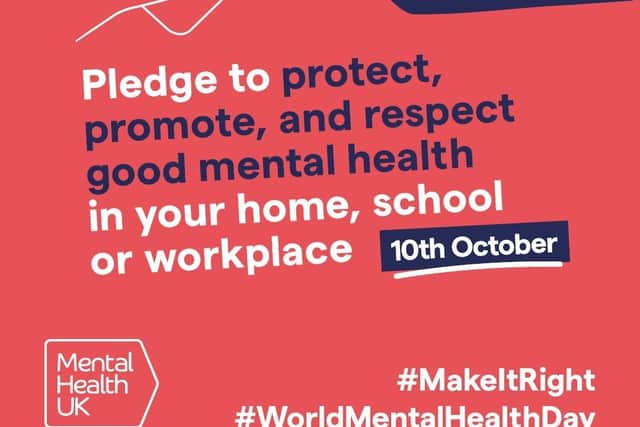World Mental Health Day: 'Mental health as a fundamental human right in the UK'
and live on Freeview channel 276
As mental health concerns affect millions of people worldwide—irrespective of age, gender, or social status—open dialogues and discussions are needed to combat stigma and encourage support.
This special day provides a platform for advocacy and solidarity, inspiring countries, communities, and individuals to come together and work towards meaningful and positive change in mental health care and support. Join us as we celebrate World Mental Health Day and strive to create a kinder, more compassionate world for all.
Advertisement
Hide AdAdvertisement
Hide AdUnderstanding mental health as a fundamental human right is crucial for individuals and as a society, and this perspective is especially applicable in the UK's context.


Mental Health Conditions In The UK
According to the Office for National Statistics (ONS), one in five adults in the UK experienced some form of depression in early 2021. This statistic shows an increase from one in 10 before the COVID-19 pandemic—a clear testament to the evolving mental health crisis in the UK and hence a demand for more comprehensive mental health policies and legislations.
Mental Health As A Human Right
Recognizing mental health as a human right means that everyone, without any discrimination, has the right to enjoy the highest attainable standard of physical and mental health.
The adoption of a human rights approach to mental health enables us to see and tackle inequalities in mental health outcomes.
Advertisement
Hide AdAdvertisement
Hide AdMental health should no longer be seen solely as a medical or personal areial but should be recognised as a matter of social, political, and economic rights.
LEGISLATIVE PROVISIONS
The UK has taken quite a few significant strides in ensuring that this right is protected under the law. The Equality Act 2010 is one of the landmark pieces of legislation. It protects individuals from discrimination due to their mental health and considers poor mental health a disability.
The Mental Health Act 1983, revised in 2007, sets the blueprint for treating individuals suffering from mental health disorders against their consent if deemed necessary for their or others' safety. However, this legislation has been a topic of considerable debate, prompting reviews and ongoing discussions about its execution.
CHALLENGES & EFFORTS
Despite these efforts, there are numerous challenges in addressing mental health from a human rights perspective. For example, accessibility to mental health services remains limited, particularly among vulnerable groups such as the homeless, ethnic minorities, and LGBTQ+ individuals.
Advertisement
Hide AdAdvertisement
Hide AdIn response, the UK has launched several initiatives like the NHS Long Term Plan, published in 2019, that promises to make additional investments to increase access to mental health services. It aims to provide an additional 345,000 children and young people access to mental health support by 2023/24.
The UK government have also recently launched the 'Suicide Prevention Strategy: 2023 - 2028'.
The strategy stresses the importance of early detection and intervention. Collaborating with educational institutions, workplaces, and healthcare facilities, the government aims to identify those at risk at an early stage.
School programs focusing on mental health education and resilience-building, and workplace protocols and support systems for employee wellness, are to become more commonplace and more robust.
WORLD MENTAL HEALTH DAY: THE WAY FORWARD
Advertisement
Hide AdAdvertisement
Hide AdMental health as a human right is not just about policy measures and legal implications—it is also about altering the narrative around mental health.
Normalising conversations around mental health, fighting against stigmatization, and making mental health a priority at every level of society are important components of recognising mental health as a human right.
While the journey is long and arduous, the UK is taking essential steps in the right direction, albeit slowly. The COVID-19 pandemic's impact has accelerated efforts to center mental health in health and social care policies—a positive and necessary direction for all societies to take.